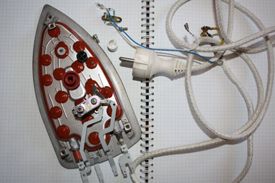
A household tool called an electric iron is used to press and iron clothing to smooth out creases and make them wrinkle-free. There are many different types and designs of electric irons on the market, including as travel-sized, cordless, and traditional steam variants. They are necessary home appliances to keep fabrics and apparel properly ironed.
To avoid mishaps and guarantee user safety, household and comparable electrical appliance safety particularly that of electric irons is vital. Customers must use caution and adhere to the safety instructions supplied by the manufacturer in the user manual when using electric irons. Another way to ensure the safe usage of these appliances is to do routine maintenance and inspections on wires and plugs.
Every household electrical appliance's safety, including that of the electric iron, is covered by the required ISI Certification Scheme in accordance with IS standard IS 302 (Part-2/Sec-3): 2007.
The safety criteria for residential and comparable electric irons—dry and steam—are covered by this standard. It also offers irons with an independent boiler or water reservoir that can hold up to 5 liters and run at voltages no higher than 250 V.
Without the ISI Mark, this product cannot be marketed, imported, or exported into the Indian consumer market.
Indian Standards Institute, or ISI was renamed the Bureau of Indian Standards (BIS) in 1987. The official mark that the Bureau of Indian Standards provides for manufacturers of various goods is the ISI Mark. It is used to indicate compliance with Indian standards (IS) set by the Bureau of Indian Standards (BIS) and has been used as a conformity marking for industrial products. Manufacturers received permission from BIS to use the ISI Mark on items that comply with relevant Indian requirements through the product certification program.
Only manufacturers (domestic or foreign) who produce the finished product will be awarded ISI Certification. This will not be given to any product importers, traders, dealers, or distributors.
The following documentation is required to get an ISI certification:
For more detailed information, please click here.
There are two approaches for Indian manufacturers to become certified with the ISI Mark:
Regular Procedure
With the possible exception of cases deemed "All India first," which might take up to 180 days, the licensing procedure is expected to be finished in 120 days. This timeline starts on the day the application is received, assuming that at different points in time the documentation, unit assessment, and product conformance are all deemed acceptable.
Step 1: Manufacturing Unit Customization in Compliance with Applicable Indian Standards
Step 2: Submission of the Application Form
For more detailed information, please click here.
Simplified Procedure
This is a much faster process than the standard procedure. After a factory inspection is deemed satisfactory and the initial evaluation establishes that the sample complies with the applicable Indian Standard(s), the license application process is expected to be finished in 30 days.
Step 1: Adapting the Manufacturing Unit to Comply with the Relevant Indian Standard
Step 2: Sample Testing
For more detailed information, please click here
The process of obtaining ISI Mark Certification for Foreign Manufacturers typically includes the following steps:
Step 1: Application
Step 2: Query Raised (If Any)
For more detailed information, please click here.
Brand Liaison provides helpful support for achieving ISI Mark Certification. Among our offerings are:
Please click here to get in contact with our team of specialists for a deeper explanation of the paperwork and steps needed to get ISI Mark Certification.